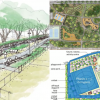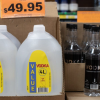British Columbians making $10.85 an hour on Thursday received a fifty cent raise by Friday morning as the province officially increased its minimum wage to $11.35 an hour.
It’s a hotly debated topic with many sides to the argument.
B.C. has one of the highest costs of living in the country. The province's three major cities all rank in the countries top ten most expensive rental markets. Neighbours to the east in Alberta will have a minimum wage of $15/hr by October 1st, 2018 and neighbours to the far east in Ontario will have a $15 minimum wage by 2019.

Friday's increase was B.C.'s second minimum wage increase in 12 months after the BC Liberals raised the minimum wage to $10.85 last September. During May's provincial election the BC NDP ran on a $15 minimum wage by 2021 platform.

“The minimum wage needs to be $15 an hour, and New Democrats are going to get it there," said current BC Premier, John Horgan in 2016.
"Minimum wage is no longer something earned just by teenagers in their first jobs. Students, parents, seniors, new Canadians in every part of the economy are paid minimum wage."
But is raising the minimum wage the best way to grow the economy or the best way to win political votes?

“Is the minimum wage the best instrument we can think of for achieving more equity in the distribution of incomes? It really isn't,” said UBCO Economics Professor, Ross Hickey.
“But it’s one of the most available, which makes the minimum wage a very political economic instrument. It really is about appealing to people’s sense of fairness, but the question is what about the cost of implementing fairness in that particular way?”
Friday’s fifty cent minimum wage increase affected 90,000 employees in B.C.’s three million plus workforce but the ripple effect of rising prices may be felt by all the province's residents.
“Thinking in terms as an economist, there are things that are income problems and there are things that are price problems and this is a case where we are using a price to solve an income problem,” explained Hickey.
“The minimum wage is the price of labour. If we have a problem with the distribution of income then maybe we should be addressing the distribution of income directly and not the price of labour.”
So what happens when a price problem is used to solve an income distribution problem? It can have negative effects on the very demographic it should be helping.

“Some of our customers make minimum wage, so if they now make a little more but they have to turn around and spend that extra wage at a restaurant or coffee shop because the business had to raise their pricing then you're at the status quo,” said the owner of downtown’s Pulp Fiction Coffee House, Max Sloan.
“Our staff make above the minimum wage increase but if the wage gets too high then you start getting by with less staff. That will affect demographics like students who are already struggling to find jobs. It’s kind of a double edged sword, it all sounds good but you have to be pragmatic about it."

According to Hickey, a better economic option could be redistributing taxation and transfers.
“If there are people with low income, an option could be transferring more services to them through the tax system as opposed to increasing the price of labour,” said Hickey.
“Fast food service industry workers are making minimum wage and fast food establishments tend to have a larger demographic of minimum wage earning customers, and ironically those restaurants will likely raise their prices and directly affect minimum wage earning customers.”
While a noted supporter of increasing the minimum wage, BC Green Party Leader Andrew Weaver has been critical of the BC NDP’s minimum wage promises.
Weaver released this statement regarding John Horgan’s promise of $15 an hour by 2021.
“Although I am pleased to see an important piece of our agreement move forward, I am concerned that the apparent addition of a 2021 timeline is prejudicial to the work of the Fair Wages Commission. The Commission falls under the Confidence and Supply Agreement between the BC NDP and BC Green caucuses. The 2021 timeline had not been agreed upon and is, in fact, contradictory to the intention of depoliticizing the Fair Wages Commission."
“The Fair Wages Commission should determine the timeline for minimum wage increases based on evidence and through consultation with stakeholders. The Commission must consult with small businesses, which are the backbone of our economy, to ensure they can continue to thrive. The timeline and wage increases should not be made for political purposes and should not be arbitrarily set in advance."
B.C.'s Labour Minister Harry Bains has now said the province will not commit to raising the minimum wage to $15 an hour by 2021.
The NDP still wants to get to $15, Bains maintained, but there’s no longer a timeline on this pledge.
















